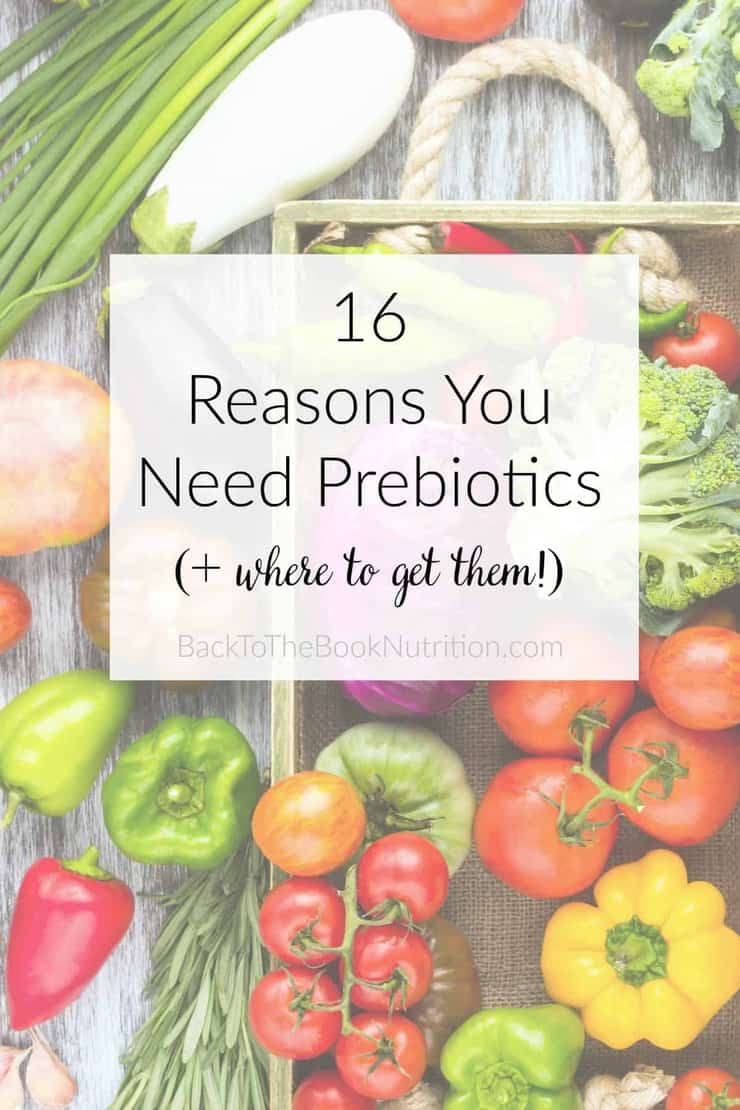We all know we need probiotics, but are you getting enough prebiotics? Find out how prebiotics improve your health and how to get more of them!

Note from Dena: This guest post was written by Telma Moreira, Dietetic Intern, as part of a research partnership between Back To The Book Nutrition and post-graduate nutrition students from the University of Houston.
What are prebiotics?
We’ve all heard a lot about probiotics – friendly bacteria with many beneficial effects on our health. Prebiotics are, simply put, the fuel that probiotics need to thrive. They are a type of fiber found in plant foods like fruits, vegetables, beans, nuts, etc.(1)
Types of Prebiotics
The most studied prebiotics are fructo-oligosaccharides (FOS), inulin (a type of FOS), and galacto-oligosaccharides. These are found naturally in many fiber containing plant foods, but you may also find these names in the list of ingredients in food labels since they are sometimes added to boost fiber content.
Common Terms Used to Describe Prebiotics
Various terms are used to describe prebiotics. Even though some of them refer to fiber that acts in slightly different ways and behaves differently once in our digestive tract, they all are beneficial to our health and their effects on our body are similar:
- Fiber
- Fermentable (or low digestible) carbohydrate
- Fermentable (or nondigestible) oligosaccharides
- Resistant starch
- Soluble fiber
What Do Prebiotics Do?
Prebiotics specifically favor the growth of two types of intestinal bacteria, which are well known for the beneficial role they place as probiotics (discussed in more detail below).
Prebiotics feed 2 types of gut bacteria:
- Bifidobacteria
- Lactobacilli
These bacteria ferment prebiotics, producing “short chain fatty acids” (SCFAs) – namely Butyrate. SCFAs are, in turn, an important nutrient for the cells of your large intestine, and have an important role in prevention and management of various diseases.
16 Reasons You Need Prebiotics (1-4, 10-11)
1. To feed beneficial bacteria (probiotics) as they travel through the intestines
Make sure that you eat a variety of fiber rich foods throughout the day together with your probiotics to make probiotics thrive.
2. To reduce inflammation in the gut
Those SCFAs that probiotics produce from prebiotics help decrease inflammation, thereby reducing risk for many chronic health conditions and diseases.
3. To promote bowel regularity
Prebiotics can be of great help if you suffer from constipation. By favoring the growth of friendly bacteria and through fermentation, prebiotics can help keeping your bowel movements regular.
4. To help prevent leaky gut
Leaky gut is becoming more common and is linked to food sensitivities, skin rashes, depression, anxiety, and autoimmunity. The production of SCFA by intestinal bacteria contributes to the robustness of the intestinal wall. This is essential to prevent harmful bacteria and toxins from re-entering circulation through a “leaky” gut wall.
5. To prevent allergies
Prebiotics might help prevent allergies in infants at risk of developing them. Ask a health practitioner when and how to add prebiotics to your baby’s meals.
6. To boost immune function
Prebiotics assist probiotics as they enhance immune function to better fight off infection.
7. To aid weight management
When eating prebiotic rich foods, you will feel more satiated. This is an easy way of controlling your appetite and maintaining a healthy weight. Preliminary animal data suggest that SCFA production resulting from prebiotic intake is associated with lower body weights, regardless of calorie intake.(10) Furthermore, a recent study done in overweight children showed that prebiotics significantly reduced body weight and percentage of body fat. (11)
8. To improve absorption of minerals
Adding prebiotics to your diet can increase the absorption of essential minerals which many people need more of, such as magnesium, calcium, zinc and, possibly, iron.
9. To support bone health
Improved calcium absorption (mentioned above), along with adequate intake of fat soluble vitamins A,D,E, and K means stronger bones.
10. To reduce risk of Colon cancer
The greater production of SCFA protects your intestine and helps prevent colon cancer.
11. To help balance blood sugar
Adding prebiotics to your diet will help control your blood sugar. This is helpful for all of us, but especially important for diabetics.
12. To reduce Irritable bowel syndrome (IBS) symptoms
For some IBS sufferers, prebiotics can reduce abdominal pain and inflammation, and help regulate bowel movements (more on this below).
13. To alleviate traveler’s diarrhea
Prebiotics – especially in combination with certain strains of probitoics like Lactobacillus acidophilus, Lactobacillus rhamnosis, Bifidobacterium bifidum, and Saccharomyces boulardii – may help prevent or alleviate traveler’s diarrhea, acquired by drinking contaminated food or water when traveling to countries with poor sanitation.
Of course, precautions should always be taken to avoid unsanitary food and water – but having pre- and probiotics on hand just in case isn’t a bad idea!
14. To help prevent Autoimmune conditions
Leaky gut is believed by many autoimmune experts to be a necessary precursor to the development of autoimmune conditions. By helping maintain a tightly sealed intestinal wall, prebiotics can prevent toxins and undigested food proteins from entering circulation, where they can trigger immune and eventually autoimmune responses.
15. To improve symptoms in Autistic spectrum disorders (ASD)
Bacteria in the gut directly impact the brain and various neurological processes. Improving gut health has been shown to improve autism and ASD symptoms.
16. Reduce risk of eczema and food allergies/sensitivities
Eczema and various other skin disorders, as well as food allergies and sensitivities, are linked to leaky gut. Adequate prebiotic intake can help prevent these conditions, and can assist in improving gut health in order to reduce symptoms.

BEST SOURCES OF PREBIOTICS
Food sources of Prebiotics
Eating a variety of fiber-rich food throughout the day will will ensure you get your prebiotics. If prebiotics are not part of your usual diet, increase intake gradually to prevent bloating and gas. Increasing your fluid intake will also help prevent uncomfortable gut symptoms. (2)
The following foods are excellent sources of prebiotics:
- Chicory
- Jerusalem artichokes
- Onions
- Garlic
- Leeks
- Cabbage
- Asparagus
- Artichokes
- Soybeans
- Whole grains
- Yams
- Sweet potatoes
- Legumes
- Nuts
- Seeds
Do you need a Prebiotic supplement?
Eating whole foods containing prebiotics is the best option. Remember that there are different types of prebiotics, often in higher concentrations and greater variety than in supplements.(2,9)
In addition, whole foods come with a variety of other vitamins, minerals, and phytochemicals that promote health.
Consider taking a supplement if you:
- Have irritable bowel syndrome (IBS) or inflammatory bowel disease and you do not tolerate prebiotic foods.
- Are taking medications that kill off friendly (probiotic) bacteria and/or promote the growth of undesirable bacteria. Examples include antacids, antibiotics, and oral contraceptives.
- Have another medical issue that prevents you from consuming fiber rich foods.
Types of Prebiotic Supplements
When choosing a supplement, keep in mind that prebiotic supplements are available as prebiotics only, or in combination with probiotics.
- Prebiotics: These usually contain one or more prebiotics, and come in capsule or powder form.
- Synbiotics: these supplements contain probiotics plus prebiotics. Even if taking both the friendly bacteria and their fuel all at once sounds like the perfect option, they typically contain only a very small amount of prebiotics.
As with prebiotic foods, always start with a small dose of prebiotic supplement, and increase gradually to prevent gas and bloating.
Who should not take prebiotics?
Sometimes, prebiotics may not be a good choice.(2) If you have any of the following conditions, especially if they are not well managed, your already sensitive gut may react negatively to the fermentation of prebiotics, and your symptoms may worsen:
- Small intestine fungal overgrowth (SIFO)
- Some cases of Irritable bowel syndrome (IBS) – especially if SIBO or SIFO are present
- Bloating, severe constipation
- If you are following a “Low FODMAP diet”, often used to help manage symptoms of irritable bowel syndrome.
You may benefit from slowly introducing prebiotics at some point during the treatment of these conditions. However, the study of prebiotics for the treatment of gut conditions is still developing, and there is a lack of consensus among practitioners on the benefits of adding them, in what amount, and when during the course of the treatment.
Consult with a licensed healthcare practitioner to determine whether prebiotic foods and/or supplements are right for you.
Check out these related posts!


Easy Probiotic Fermented Carrots

About the author: Telma Moreira is a registered dietitian in her country of origin (Argentina), working on the validation of her degree in the United States. After working for many years with seriously ill people, she became passionate of preventing disease through a healthy lifestyle.
References:
- Coleman Collins S. (2014). Entering the World of Prebiotics — Are They a Precursor to Good Gut Health? Today’s Dietitian, 16, No.12
- Kellow, N.J., Coughlan, M.T., & Reid, C.M.(2014). Metabolic benefits of dietary prebiotics in human subjects: a systematic review of randomised controlled trials. British Journal of Nutrition, 111, 1147-1161.
- Cuello-Garcia, C.A., Fiocchi, A., Pawankar, R., et al. (2016). World Allergy Organization-McMaster University Guidelines for Allergic Disease Prevention (GLAD-P): Prebiotics.
- Beserra, B.T., Fernandes, R., do Rosario, V.A., Mocellin, M.C., Kuntz, M.G., & Trindade. E.B. (2015). A systematic review and meta-analysis of the prebiotics and synbiotics effects on glycaemia, insulin concentrations and lipid parameters in adult patients with overweight or obesity. Clinical Nutrition, 34, 845-858.
- Grimaldi, R., Cela D., Swann, J.R., Vulevic, J., Gibson, G.R., Tzortzis, G., & Costabile, (2017). In vitro fermentation of B-GOS: impact on faecal bacterial populations and metabolic activity in autistic and non-autistic children. Microbiology Ecology, 93.
- Li, Q., Han, Y., Dy, A.B., & Hagerman R.J. (2017). The Gut Microbiota and Autism Spectrum Disorders. Frontiers in cellular neuroscience.
- West, C.E., Dzidic, M., Prescott, S.L., & Jenmalm, M.C. (2017). Bugging allergy; role of pre-, pro- and synbiotics in allergy prevention. Allergology International, 66, 529-538
- Fujimori, S. (2015). What are the effects of proton pump inhibitors on the small intestine? World Journal of Gastroenterology, 21, 6817-6819
- Nicolucci, A.C., Hume, M.P., Martinez, I., Mayengbam, S., Walter, J., & Reimer, R.A. (2017). Prebiotics Reduce Body Fat and Alter Intestinal Microbiota in Children Who Are Overweight or With Obesity. Gastroenterology, 153, 711–722.
Original article and pictures take www.backtothebooknutrition.com site
Комментариев нет:
Отправить комментарий